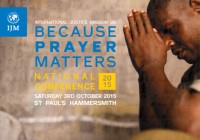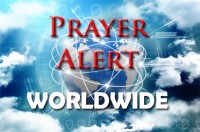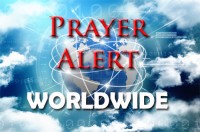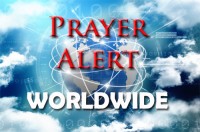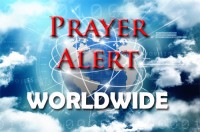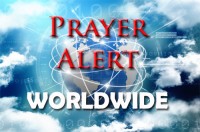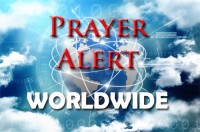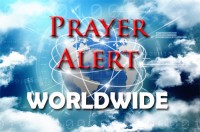Leila’s testimonial
‘I was born in Bethlehem. I’m one of 200,000 Palestinians living in Bethlehem. As a child I used to go to Jerusalem, to the Holy Sepulchre church, a special place for us Christians, and I swam in the sea in Tel Aviv. Things changed with the Intifada War. Curfews and bombs. Then they built the wall and now I need permission to go into Israel. I’ve been living with this division - and I don’t want my children to live the same way. I had never met an Israeli, only soldiers with guns. Then I went on a young adults’ trip with an organisation called Musalaha and had the chance to meet Israelis and even become friends with them. I still meet with them and we talk about reconciliation and how to accept each other. I hope for a peaceful solution, and I believe in the power of One I know.’
Church engaging with Rugby World Cup
The Rugby World Cup, the world’s third largest sporting event, is now in full flow, and churches across the land are engaging with their communities in themed rugby events. A global prayer wave started last Friday, the day before the World Cup began. Participating churches across the nations prayed at 8.00 pm local time, creating a prayer wave of people gathered in groups to cover the event in prayer. It was tracked online via an interactive world map on the Engage 2015 website allowing people to see the progress and contribute to a global community of prayers for the Rugby World Cup 2015. Across the UK churches have been organising rugby-themed prayer groups and church services, community festivals, family hosting for overseas visitors, screening the matches in church buildings, hosting guest events, and much more.
Because Prayer Matters
Prayer matters. It is essential to all that we do and everything we are. This year add your voice as hundreds from all over the UK pray boldly for the work of Justice. IJM's National Conference will be held on Saturday the third of October at St Pauls Hammersmith, London. Hear stories of hope, inexplicable joy and triumph first hand. Discover God's heart for justice. Your eyes will be opened and your heart will be transformed. And because of your prayers, lives will be changed.
IJM's National Conference is a transformative event like you've never experienced. You will pray, you will worship and you will encounter God as you stand on the front lines of injustice with IJM's staff and friends from around the world.
This year's speakers include IJM's director of investigations – who cannot be named for security reasons, Anu George, IJM director of national strategy and interventions, Terry Tennens Chief Executive of IJM UK and many many more.
Join IJM and experience first-hand God pouring out his passion among his people for the work of justice throughout the world. Be encouraged and pray with boldness, on behalf of those who are in need of his love and justice in the world. Join IJM on the 3rd October in Hammersmith. Tickets and further information available from http://www.ijmuk.org/conference
Source: International Justice Mission
Nepal: Update - lawmakers vote for secularism
Further to our article on 27 August (Nepal’s proposed constitutional amendments would make Christianity illegal), lawmakers voted on Monday for Nepal to remain secular, thus protecting minority religions from persecution. Following this vote, bombs exploded at two different churches in Jhapa district in eastern Nepal, according to the Kathmandu Post. There were no casualties but the churches suffered damage. Police said investigations into the blasts were under way. Despite this week’s vote for secularism, the draft constitution still includes the statement that the state will safeguard ‘Sanatan Dharma’ - often used as an alternative term to describe Hinduism. Christian leaders have also expressed concern about the provisions targeting religious conversions and proselytising. Nevertheless, this week’s vote represents a step forward, considering politicians had recently raised the possibility of removing secularism altogether.
USA: California fire devastation
By Monday night, fast-moving weekend wildfires in Valley and Butte, in Northern California, had destroyed 700 homes and 1,000 other structures. 143,523 acres were burned and 23,000 people in total were displaced. The flash fires sent residents running for their lives when they raced through dry brush and exploded in size within hours. Ranchers are losing millions of dollars’ worth of grazing land and cattle. On Tuesday those who fled the flames had a chance briefly to return home to retrieve pets and feed livestock. They were escorted to their homes by the County sheriff’s department and had to provide an ID confirming their address in the evacuation zone. This summer's fires are the most volatile in 30 years, caused by extremely dry conditions from a drought. Bushes and trees have absolutely no moisture in them and humidity is so low that these 'fire starts' just erupt into infernos.
Central African Republic: Election vote challenges
Attempts to foster reconciliation in Central African Republic could be derailed if refugees who fled to neighbouring states after the coup are unable to cast votes in the upcoming presidential election, billed as a major peacebuilding milestone. Around 470,000 Central Africans (10% of the population) are refugees in Cameroon, Chad, Congo-Brazzaville, and the Democratic Republic of Congo. CAR’s constitutional court overturned parliament’s earlier decision to exclude the refugees and ruled that all citizens should be allowed to vote in the 18 October election, whether they reside in the country or elsewhere. But eight weeks later, there are still no measures in place to allow the estimated 198,000 eligible refugee voters to actually cast their votes. The interim president, who steps down after the election, is opposed to allowing refugees to vote because of the organisational and logistical difficulties it would involve.
Nigeria: Clergy conduct more funerals than weddings
A bishop in Plateau state, Nigeria, said that during the last fifteen years he has conducted more funerals than weddings. Addressing hundreds of demonstrators at the Plateau House of Assembly on 31 August, the Rt Rev Benjamin Kwashi, Anglican archbishop of Jos, said the Christian funerals resulted from attacks by Muslim Fulani herdsmen working with Boko Haram jihadists. ‘As a pastor, since 2001 I have conducted more burial services of those killed through attacks than weddings and naming ceremonies. It's sad to note that most victims are harmless children, infants, women and youths. The Nigerian government must end the killings. Attention should not be concentrated in the northeast alone, as people are being killed here in Plateau, Benue, Nasarawa and Kaduna states.’ A protestor at the event said the Nigerian government's silence about the killings shows its silent support for the ongoing jihad against Nigeria's Christians.
Syria: Russia has 'positioned tanks in Syrian airfield'
Russia has positioned at least seven Russian T-90 tanks at an airfield near the Syrian government stronghold of Latakia, in a continued show of support by the Kremlin for President Bashar Al-Assad. Washington has said that the movement on the ground in Syria appears to indicate that Russia intends to create a forward air operating base at the airfield in the port city, which has been at the centre of a recent Russian military build-up in Syria. The Syrian Ambassador to Russia has rejected the claims as a lie spread by the US. ‘We have been co-operating with Russia for 30-40 years in various areas, including the military sphere. We receive arms and military equipment in line with agreements between our countries.’ He added, ‘Supplies to Syria are accompanied by Russian specialists, who help to adjust the equipment and train Syrian personnel how to use the weaponry.’
Syria: Russia has 'positioned tanks in Syrian airfield'
Russia has positioned at least seven Russian T-90 tanks at an airfield near the Syrian government stronghold of Latakia, in a continued show of support by the Kremlin for President Bashar Al-Assad. Washington has said that the movement on the ground in Syria appears to indicate that Russia intends to create a forward air operating base at the airfield in the port city, which has been at the centre of a recent Russian military build-up in Syria. The Syrian Ambassador to Russia has rejected the claims as a lie spread by the US. ‘We have been co-operating with Russia for 30-40 years in various areas, including the military sphere. We receive arms and military equipment in line with agreements between our countries.’ He added, ‘Supplies to Syria are accompanied by Russian specialists, who help to adjust the equipment and train Syrian personnel how to use the weaponry.’
Azerbaijan: Old world and new
Sadly, corruption prevails here. Azerbaijan has high ratings of human development, but the government in this prosperous country abuses many rights of its population. Christianity is frequently associated with Russian imperialism and Armenian enmity, so Christians are harassed by law enforcement and threatened with heavy fines. As the first Muslim-majority democratic and secular republic, there is evidence of a new movement in Azerbaijani history. God has blessed the land with oil and natural gases and we are asked to pray for God to protect the nation from outside forces plundering its resources and territories. Most Azerbaijanis do not know Jesus Christ. We can pray for the few believers in the land to ‘proclaim what great things Jesus has done’ (Mk.5:20) in the dozens of towns and villages which have never heard the Gospel. Pray for believers to lead the way in providing enduring solutions to conflicts with Armenia and Russia by ‘loving and doing good’ (Lk.6:27)



